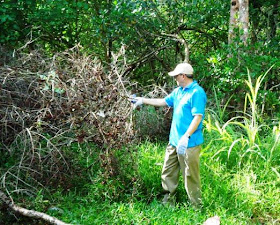The Multilateral Environmental Agreements Unit (MEAU) of the Ministry of the Environment and Water Resources hosted a one day Sensitisation and Capacity Building
Session on September 19, 2012 at the Centre of Excellence, Macoya. The purpose of the session was to
sensitize all stakeholders from ministries, Government agencies,
academic institutions, industry and non-governmental organisations
(NGOs) on the MEAs under its purview.
The
event was well attended by over
100 Focal Points, who are persons nominated to represent relevant
stakeholders from the various sectors. In the Ministry’s endeavour to
build a
comprehensive Focal Point Network, the initial stage of engagement at
this
session was focused on raising awareness, sensitising and informing the
stakeholders of the current MEAs and its Projects which are currently
overseen
by the MEAU. The Session also emphasised the importance of each Focal Point’s role in the
success of environmental management from a holistic view to fulfil Trinidad and
Tobago’s mandates and responsibilities under the Conventions it is signatory.
The session commenced with introductory remarks by the Minister of the
Environment and Water Resources, Senator the Honourable Mr Ganga Singh and opening remarks by Head of the MEAU, Mr Kishan
Kumarsingh, as well as the official launching of the MEA booklet for stakeholders. The day was then focused on an introduction to the various MEAs under the
purview of the MEAU and several of the ongoing specialised projects
which contribute toward the fulfilment of our national obligations.
Climate Change was first on the
agenda with an introduction to the United Nations Framework Convention
on
Climate Change (UNFCCC) and its Kyoto Protocol, followed by a brief overview
of two projects: Mainstreaming Climate Change into National
Development and Capacity Building for Participation in Carbon Markets; and the Elaboration of a Strategy for the Reduction
of Carbon Emissions in Trinidad and Tobago.
 |
| Senator the Honourable Minister of the Environment and Water Resources Mr Ganga Singh emphasises the importance of the focal point network and collaboration in achieving national results |
The National
Ozone Unit also provided an overview on the
Montreal Protocol and the projects currently being executed with its
stakeholders. Subsequent to this, the Convention on Biodiversity (CBD) and its
Cartagena Protocol and the United Nations Convention to Combat Desertification
(UNCCD) were introduced, highlighting their national relevance and importance. Conventions that fall within the Waste and
Chemicals cluster were also addressed, including the Basel, Rotterdam, and Stockholm Conventions.
An outline of the national project entitled Initial Assistance to Enable Trinidad and
Tobago to fulfil its Obligations under the Stockholm Convention on Persistent
Organic Pollutants (POPs) was then presented, followed by the Basel Convention Regional Centre
for Training and Technology Transfer for the Caribbean Region, providing
information on their responsibility and mandates as a Regional Centre.
Proceedings
were
then focused on interaction and feedback from the participants, with a
working
session that highlighted the MEAs within the national context for Sustainable Development. The participants were then
separated
into constituencies along the respective Convention themes that seemed
to be a best fit for their organisation, and were allowed to express
their views on the day’s events, provide
feedback on a previously distributed survey and discuss any matters
arising out
of the Sensitisation Session.
 |
| Focal point from the Tobago House of Assembly airing her concerns during one of the question and answer sessions throughout the day |
The event proved
very useful and will be followed up with engagement opportunities for the Focal
Points. Further to this, the MEAU continues to increase and improve on the Focal
Point Database and examine different methods for continued communication and
capacity building. This is to ensure the success of this network and information exchange to foster comprehensive
national communication at the Conventions to which Trinidad and Tobago is a signatory.
Below are the presentations and information from the MEA Focal Point Sensitisation Session:
- MEAs Booklet
- Introduction to UNFCCC and Kyoto Protocol
- Project: Mainstreaming Climate Change into National Development and Capacity Building for Participation in Carbon Markets
- Project: Elaboration of a Strategy for the Reduction of Carbon Emissions in Trinidad and Tobago
- Introduction to the Montreal Protocol and the National Ozone Unit
- Introduction to the United Nations Convention to Combat Desertification
- Introduction to the Convention on Biological Diversity
- Introduction to the Basel, Rotterdam and Stockholm Conventions
- Project: Development of a National Implementation Plan for the Stockholm Convention on Persistent Organic Pollutants
- Introduction to the Basel Convention Regional Centre for Training and Technology Transfer for the Caribbean
- MEAs and Sustainable Development
- MEA Questionnaire Feedback














